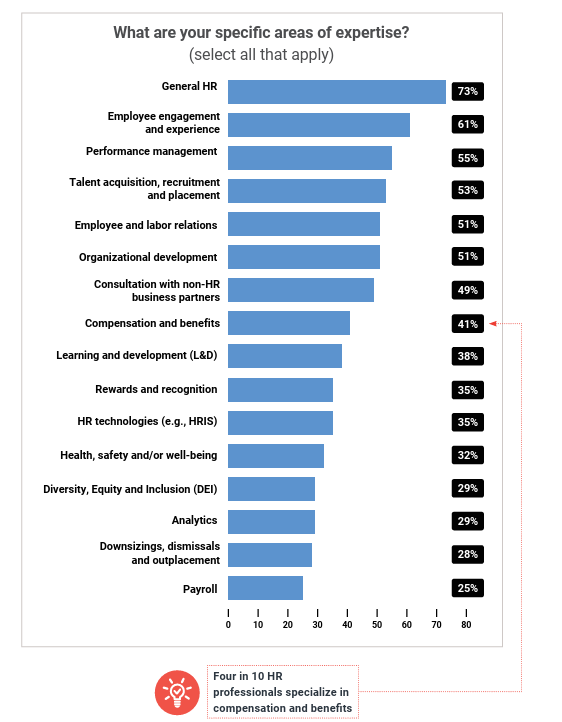HR.com’s Future of HR Skills and Strategies 2025
Transform HR with essential skills for strategic impact
Posted on 03-21-2025, Read Time: 6 Min
Share:

HR’s pursuit of a true “seat at the table” remains an uphill battle, with strategic involvement slipping in recent years:
- 44% of HR professionals say they are equal partners in business planning—a sharp drop from 58% in 2021.
- 30% are involved but limited to providing only talent-related insights.
- 25% have no strategic role at all, merely executing decisions made by others.
Many HR teams remain stuck in transactional work, yet two-thirds believe they will play a critical strategic role in the next two years. The good news? Some HR teams are already making an impact. This report explores how they are succeeding—and the key skills and trends HR professionals must embrace to cement their strategic influence.
Key Findings
- There’s still room for improvement when it comes to meeting the strategic needs of stakeholders.
- To improve competencies, HR needs to play a larger role in the strategic planning process.
- There are several gaps between current HR skills and their future importance.
- Technology is playing an increasingly important role in HR.
The Strengths and Weaknesses of HR Today
How well does HR drive and achieve business-related goals?The good news: 62% of HR professionals say they do well or very well in maximizing the employee experience. Just over half believe HR effectively drives organizational success.
However, challenges remain:
- Only 38% say HR excels at maximizing employee performance.
- Just 37% feel confident in HR’s ability to plan two years ahead.
When asked how different groups perceive HR’s ability to meet strategic needs:
- 46% of HR professionals believe executive leaders view HR as highly effective.
- However, only 38% think employees share this positive view—a modest improvement from 30% in 2024.
While HR’s influence is recognized at the leadership level, there’s still work to be done in strengthening its reputation among employees.

How Strategic Is Today’s HR?
Most HR departments dedicate the majority of their workweek to transactional tasks. In fact, 79% of HR professionals report spending 51% or more of their time on transactional activities, while only 20% say the same about strategic HR planning and implementation.For HR to make a meaningful impact on business strategy, it needs a seat at the executive table from the outset of strategic planning. Yet, the reality is:
- Only 44% of organizations view HR as an equal partner in business planning.
- 30% involve HR solely for talent-related input.
- 25% either bring HR in after strategic decisions are made—or exclude it entirely.
To drive long-term success, HR must shift from reactive execution to proactive strategy.
HR Skills and Expertise
When we asked survey respondents how they would rate their capability in their HR role, we found that 38% rate themselves as experts, and another 45% say they are proficient. The rest view their overall capability as competent (12%), advanced beginner (3%), or novice (1%), indicating much room for improvement.Those in small organizations are most likely to rate themselves as expert in their current role (54%). Only 36% of those in large organizations would rate their capability as highly and just 27% of those in midsize organizations say the same.
HR professionals often need to have in-depth expertise in many areas. This is necessitated due to the nuanced nature of work, which requires extensive knowledge of rules, procedures, legalities, and business acumen while balancing the very human needs of employees.

We further inquired with certified HR professionals about what kind of certifications they’ve received. The most common ones are:
- Senior Professional in Human Resources – SPHR (39%)
- Professional in Human Resources – PHR (31%)
- SHRM-Certified Professional – SHRM-CP (30%)
- SHRM-Senior Certified Professional – SHRM-SCP (28%)
The Role of Technology in HR
Where would HR most like to allocate its technology budget? The top priority is people analytics and data visualization (49%), followed by employee experience (46%), AI (42%), and succession management (39%).Given that people analytics is also one of the most common departmental skills gaps in HR, it’s no surprise that many professionals see this as a priority. Investing in these technologies—especially those with embedded AI—could help simplify analytics, making it more accessible and less labor-intensive for HR teams.

AI has been part of HR technologies for years, but the launch of ChatGPT in November 2022 accelerated its adoption, sparking innovation across the field. When asked about AI’s impact over the next two years,
- 57% expect AI to automate HR tasks.
- 49% believe it will enhance analytics.
- 45% see it as a driver of productivity.
However, fewer respondents recognize the growing need for AI skills within HR teams (17%) or the creation of new roles requiring AI expertise (17%)—a perspective that may be shortsighted. In our view, AI knowledge and hands-on experience with AI-driven solutions will soon become essential skills for HR professionals.
Download the full report for key takeaways and valuable insights from the study.
Error: No such template "/CustomCode/topleader/category"!


